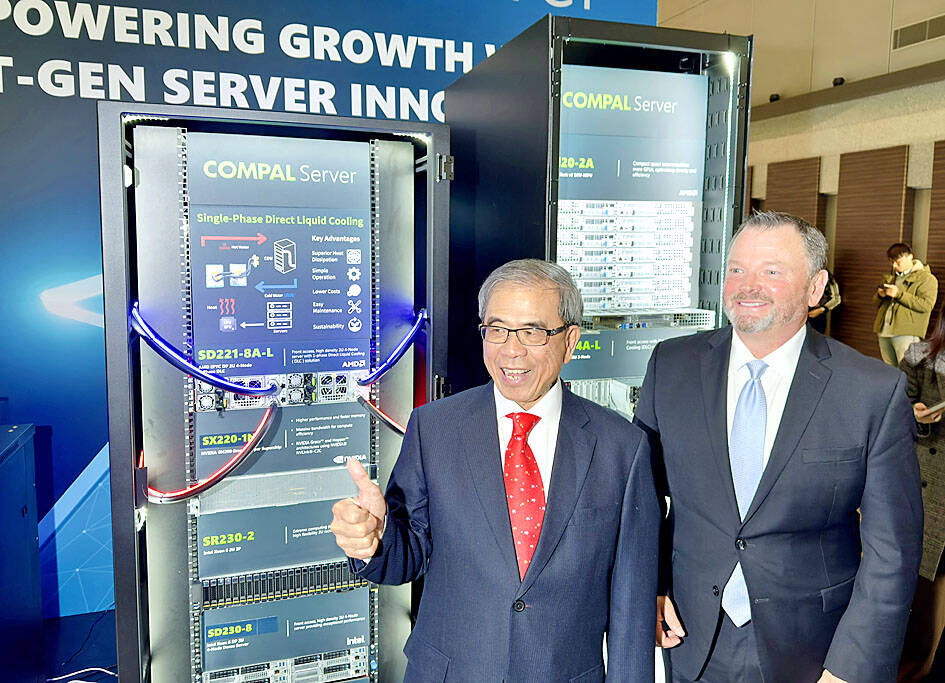Compal Electronics Inc (仁寶), one of the largest contract notebook computer makers in Taiwan, yesterday said that Texas is one of its top options as it considers investing in the US.
Speaking with reporters on the sidelines of the company’s weiya (尾牙), or year-end dinner, Compal president Anthony Peter Bonadero said that in response to the return to the White House of US president-elect Donald Trump, who vowed to raise tariffs during his campaign trail, the company is considering investments in the US.
Compal is looking at several options in particular states in the southern US, and Texas is one of the leading options, as it is the only state in the US with an independent electricity grid network, Bonadero said.

Photo: Fang Wei-chieh, Taipei Times
Compal, which also makes artificial intelligence (AI) servers, is one of several Taiwanese tech firms to list Texas as their top investment venue option.
Over the weekend, Inventec Corp (英業達) president Jack Tsai (蔡枝安), another AI server maker in Taiwan, also said that Texas is a likely choice for its US investments, citing the state’s adequate power supply, as well as its proximity to Mexico.
As global demand for AI servers largely comes from four mega data centers in the US, it is no surprise that Compal is thinking about investments in manufacturing in North America over the longer term, Bonadero said.
The company is expanding its talent pool for the fast-growing server business, while assessing a production expansion plan, he said.
Compal has joined US-based AI chip designer Nvidia Corp’s MGX server platform — a modular reference design supporting diverse applications, from remote visualization to edge supercomputing, he said.
The company aims to strengthen its ties with the US AI giant, he added.
AI servers would account for 15 percent to 20 percent of the company’s sales generated by servers this year, up from last year’s low single digits, as the company aggressively searches for business opportunities created by the Nvidia MGX ecosystem, he said.
While the large language model — which refers to a type of machine learning model designed for natural language processing tasks such as language generation — is a very important field for AI server development, Compal would also explore other areas for growth, he said.
In addition, demand for AI PCs is expected to grow this year due to the end of support from Windows 10 in the fourth quarter of the year with replacements of Chromebook computers, he said.
Demand for AI PCs would account for more than 40 percent of total PC sales next year, he said.
The company has laid a solid foundation in PC and smart device production and is looking for a new growth driver, Compal chairman Ray Chen (陳瑞聰) said.
It expects AI servers, automotive electronics and 5G products to become major sources of sales, he said.

JITTERS: Nexperia has a 20 percent market share for chips powering simpler features such as window controls, and changing supply chains could take years European carmakers are looking into ways to scratch components made with parts from China, spooked by deepening geopolitical spats playing out through chipmaker Nexperia BV and Beijing’s export controls on rare earths. To protect operations from trade ructions, several automakers are pushing major suppliers to find permanent alternatives to Chinese semiconductors, people familiar with the matter said. The industry is considering broader changes to its supply chain to adapt to shifting geopolitics, Europe’s main suppliers lobby CLEPA head Matthias Zink said. “We had some indications already — questions like: ‘How can you supply me without this dependency on China?’” Zink, who also

The number of Taiwanese working in the US rose to a record high of 137,000 last year, driven largely by Taiwan Semiconductor Manufacturing Co’s (TSMC, 台積電) rapid overseas expansion, according to government data released yesterday. A total of 666,000 Taiwanese nationals were employed abroad last year, an increase of 45,000 from 2023 and the highest level since the COVID-19 pandemic, data from the Directorate-General of Budget, Accounting and Statistics (DGBAS) showed. Overseas employment had steadily increased between 2009 and 2019, peaking at 739,000, before plunging to 319,000 in 2021 amid US-China trade tensions, global supply chain shifts, reshoring by Taiwanese companies and

Taiwan Semiconductor Manufacturing Co (TSMC, 台積電) received about NT$147 billion (US$4.71 billion) in subsidies from the US, Japanese, German and Chinese governments over the past two years for its global expansion. Financial data compiled by the world’s largest contract chipmaker showed the company secured NT$4.77 billion in subsidies from the governments in the third quarter, bringing the total for the first three quarters of the year to about NT$71.9 billion. Along with the NT$75.16 billion in financial aid TSMC received last year, the chipmaker obtained NT$147 billion in subsidies in almost two years, the data showed. The subsidies received by its subsidiaries —

At least US$50 million for the freedom of an Emirati sheikh: That is the king’s ransom paid two weeks ago to militants linked to al-Qaeda who are pushing to topple the Malian government and impose Islamic law. Alongside a crippling fuel blockade, the Group for the Support of Islam and Muslims (JNIM) has made kidnapping wealthy foreigners for a ransom a pillar of its strategy of “economic jihad.” Its goal: Oust the junta, which has struggled to contain Mali’s decade-long insurgency since taking power following back-to-back coups in 2020 and 2021, by scaring away investors and paralyzing the west African country’s economy.